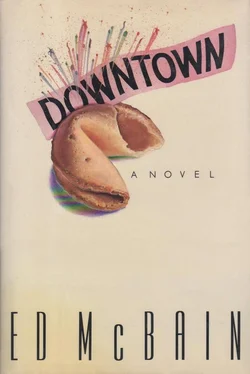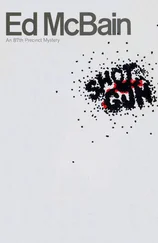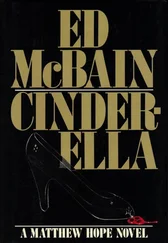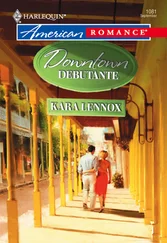Mahogany and brass, green-shaded lamps, the gentle chink of ice in glasses, the buzz of conversation, the friendly sound of laughter. Everything just as it had been before the blonde accused him of stealing her ring. Shaking his head, still amazed by what had happened, he went back to where he’d left his glass on the bar. He downed what was left of the scotch in two swallows and signaled to the bartender for another one.
The bartender scooped ice into a glass, began pouring from the bottle of Dewar’s.
“What was that all about?” he asked.
“Don’t ask,” Michael said.
“Was that guy a cop?”
“Yeah.”
“What was it? The girl hit on you?”
“What do you mean?”
“Was he Vice?”
“No, no, nothing like that.”
“ ’Cause I thought maybe she was a hooker...”
“No, she was a lawyer.”
“So what was it then?”
“She said I stole her... look, I don’t want to discuss it,” Michael said. “It’s over and done with, I don’t even want to think about it anymore.”
Shaking his head again, he picked up the fresh drink and took a long swallow.
A man sitting three stools down the bar said, “I was watching the whole thing.”
“With the hooker, you mean?” the bartender said, turning to him.
“She was a lawyer,” Michael said.
“Hookers will often claim to be lawyers, bankers, university professors, what have you,” the man down the bar said. He was tall and lanky, with a Lincolnesque face, a pronounced cleft in his chin, and a thick mane of white hair brushed back from a widow’s peak. He was in his early to mid-fifties, Michael guessed, wearing a dark gray suit with a red-and-black silk rep tie. Brown eyes. Long-fingered hands. A deep, stentorian voice. “I’ve been chatted up by hookers who claimed to be investment counselors, architects, delegates to the U.N., and even children’s book editors. They are all nonetheless hookers.”
“It’s hard to tell a hooker, this day and age,” the bartender said, nodding in agreement.
“Until they name their price,” the tall, thin man said, and then got off his stool and came up the bar to where Michael was sitting. Taking the stool the blonde had vacated, he said, “Arthur Crandall.” and took from his vest pocket a business card made of very thin black plastic. The lettering on the card was in white, and it read:
CRANDALL FILMS, LTD.
Arthur Crandall, Director
In the lower left-hand corner of the card, there was a New York address and telephone number. In the lower right-hand corner, there was a Beverly Hills address and telephone number. The card looked and felt like a strip of movie film. Which Michael now realized was its intent.
“Michael Barnes,” he said, and took a little leather card case from the right-hand pocket of his jacket, and slipped a card free, and handed it to Crandall. The card was illustrated with an orange tree that grew out of the right-hand corner, its branches and leaves spreading upward and leftward across the top of the card, its oranges overhanging green lettering that read:
GOLDEN ORANGE GROVES
16554 Fruitville Road
Sarasota, FL 34240
In the lower right-hand corner was Michael’s name, followed by the word “President,” and below that his telephone number.
“Pleased to meet you,” Crandall said. “You grow oranges, I see.”
“That’s what I do,” Michael said.
“I grow ideas, so to speak,” Crandall said. “A writer comes to me with an idea, and I nurture it along until we have, voilà, un film!”
“Would I know any of your movies?” Michael asked.
“War and Solitude?” Crandall said, and looked at him expectantly.
“Uh-huh,” Michael said.
“You’ve heard of it?”
“No.”
“That was my most recent film. War and Solitude.”
“I’m sorry, but I don’t know it,” Michael said. “I think I’ve seen almost every movie ever made...”
“I see,” Crandall said.
“Either in an actual theater or else on cable or on videocassette...”
“I see,” Crandall said again.
“... but War and Solitude doesn’t ring a...”
“But you know Platoon, right?”
“Oh, sure,”
“War and Solitude was about the U.S. intervention in Nicaragua in 1926.”
“Uh-huh,” Michael said.
“It played art houses mostly,” Crandall said.
“That must be why I missed it,” Michael said. “We don’t have too many art houses in Sarasota.”
“It was meant to be a parable of sorts,” Crandall said. “The film. But, of course. Platoon picked up all the marbles.”
“It was a pretty realistic movie, I thought,” Michael said. “ Platoon. I was only over there for a little while, but...”
“Vietnam?”
“Yes. But I thought...”
“In combat?”
“Yes. I thought he really caught the feel of it. What it was like being there.”
“You should see my movie,” Crandall said. “You want the feel of war...”
“I’ll look for it. Maybe it’ll come to Sarasota someday.”
“I doubt it,” Crandall said.
“Well, you never know.”
“Well, I do know, as a matter of fact,” Crandall said somewhat heatedly. “Since the film was made eleven years ago, and it didn’t make a nickel then, it sure as hell isn’t going to be re-released now after Platoon got the girl, the gold watch, and everything. Which, by the way, the reason I was so fascinated by the conversation between you and the girl was that it read like a movie script. A classic Hooker-John scene. Until she accused you of stealing her ring. That threw me. I found myself thinking if this hooker is trying to land this guy, why is she all at once accusing him of stealing her ring?”
“Yeah, well.”
“Very puzzling,” Crandall said.
“Anyway, she got the ring back, so I guess...”
“What do you mean?”
“It was in my pocket.”
“It was?”
“Yeah.”
“How did it get in your pocket?”
“I guess she put it there. At least, that’s what I thought until she refused to press charges.”
“Then why’d she put it in your pocket to begin with?”
“That’s just it. Listen, who the hell cares? She got her ring back, the cop let me go...”
“Well, aren’t you curious?”
“No.”
“I guess that’s why you grow oranges and I make movies,” Crandall said.
“I hate to interrupt this discussion,” the bartender said, “but do you want me to keep your tab running?”
“No, I better be on my way,” Michael said. “What do I owe you?”
The bartender handed him the bill.
Michael glanced at it, took out his wallet, opened it, and reached into the bill compartment.
There was no money in the bill compartment.
There were no credit cards in the various little slots on either side of the wallet.
His driver’s license was gone, too.
So was his card for the Sarasota Public Library.
“Shit,” he said.
“Be that as it may,” the bartender said, “who’s going to pay for these drinks here?”
“I’ll pay for the drinks,” Crandall said, somewhat testily. “Is that all you can think of is who’s going to pay for the drinks? This man has just had his money and his credit cards stolen and all you can think of...”
“All right, all right,” the bartender said.
“Is it any wonder that this city has a reputation for insensitivity? Here’s a man visiting from Florida, on Christmas Eve, no less...”
Читать дальше












